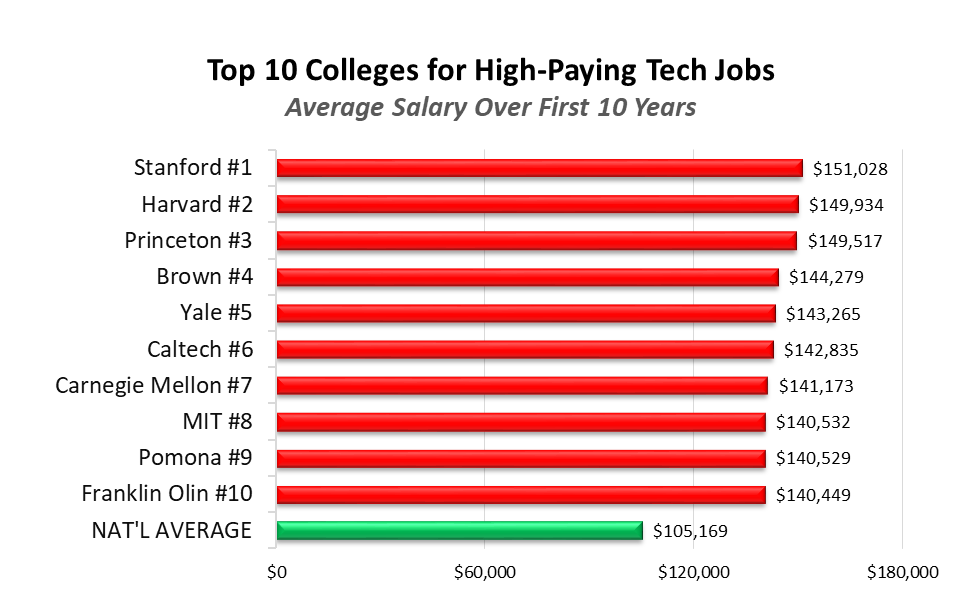Top Colleges for $$ Tech Jobs
Summary: Where you get your undergraduate degree can have a big impact on how much money you make in your tech career. And while a few elite private universities give you the biggest salary boost, a number of top public universities offer sizable raises as well.
It’s all about the Benjamins…
Let’s say you’re planning a career in tech, and you want to get the most bang for your buck from your undergraduate degree. Which universities regularly churn out graduates with the highest salaries? A 2023 study from the Burning Glass Institute (a nonprofit that studies employment trends) found that where you get your undergraduate degree can have a big impact on how much money you make down the road. Specifically, they looked at your first ten years after graduation and asked: How much more do you make than the average person at your position?
The results…
Perhaps unsurprisingly, graduates from some of the most prestigious universities commanded the highest tech salaries in the decade following graduation. Stanford led the pack; on average, graduates of Stanford who go into tech earn about $46,000 a year more than the national average. While the average tech salary in the first 10 years after graduation is $105,169, the average salary for a Stanford grad during that same time period is $151,028. That’s about a 44% raise. Not bad, considering you’ve probably got a lot of hefty student loans to pay off.
The other usual suspects made the list as well: #2 Harvard, #3 Princeton, #4 Brown, #5 Yale, #6 Caltech, #7 Carnegie Mellon, #8 MIT, etc. Generally speaking, graduates of all the colleges on this Top 10 list who go into tech earn between $140,000-$150,000 annually. It’s worth noting, however, that graduates of the Top 3 colleges (Stanford, Harvard and Princeton) earn quite a bit more than the rest. After that, the other Top 7 schools are pretty much interchangeable.
The Next 10 on the list…
The next 10 Best Colleges for tech salaries tell a similar story. Colleges on this list include #11 UPenn, #12 Duke, #13 Harvey Mudd, #14 Amherst, #15 Dartmouth, etc. On average, graduates of these schools earn anywhere from $25,000-$35,000 more than the national average, which is great, but it’s about $10,000 a year less than graduates from the Top 10 list. The salaries on this secondary list are closely lumped together, and it’s often only the difference of a few hundred dollars. The takeaway is that if you graduate from any school on this list, you’re going to earn considerably more than the national average.
Top Public Universities…
There’s more good news. Looking to save a lot on tuition? Smart shoppers know a bargain when they see one, and there are a number of excellent public universities that give you a boost in salary when you go into tech. Assuming you’re an in-state resident, you can cut your college costs in half, if not more, by attending one of the state schools on the list.
But when you look at public universities, there’s one school that stands head and shoulders above the rest, and that’s UC Berkeley. Graduates of Berkeley earn an average salary of $140,960 in their first 10 years after graduation, which is $35,000 more than the national average. UC Berkeley just has a knack for churning out graduates with the highest salaries in a wide variety of highly competitive fields, and tech is definitely one of them.
After UC Berkeley, there are a number of very good public universities that boost your tech salary $15,000-$20,000 above the national average. For example, there’s #2 University of Michigan, #3 UCLA, #4 University of Illinois at Urbana-Champaign, #5 University of Washington, etc. But it should be noted that after top-rated UC Berkeley, there’s a steep drop-off in salary.
The difference between #1 UC Berkeley and #2 Univ. of Michigan is more than $13,000/year. After that, the salaries are closely clumped together. It should also be noted that salaries on this list are generally $10,000 less than salaries from the Tier 2 private college list. The takeaway from this is that with the exception of UC Berkeley, tech employers tend to pay quite a bit more for private college graduates, though the study didn’t explore why.
More Public University Options…
There are a number of very good public universities that didn’t make the Top 10 list, but that still give you a decent boost in tech salary. Some of these include #11 San Jose State, #12 Georgia Tech, #13 UC Santa Barbara, #14 Cal State University-Chico, and #15 UT Austin. All of the public universities on this Top 20 list are known for having strong tech departments. It’s notable, however, that 6 of the Top 10 (and 10 of the Top 20) are all based in California. Many of these schools benefit from their proximity to Silicon Valley, which means there are excellent opportunities for internships, alumni networking, and plenty of high-paying tech jobs.
With its world-class technology programs, and Silicon Valley right next door, Stanford leads the pack for graduates going into tech careers, who can expect to earn almost 50% more than the national average.
Just like Stanford and Harvard, Princeton graduates who go into tech can expect to earn significantly more than the national average, as much as $40,000 more annually over their first 10 years.
If you’re looking for a very small (fewer than 2,000 students) but highly competitive liberal arts college, then Amherst College in Massachusetts is an excellent choice; graduates in top fields like tech typically earn 30% more than the national average.
Although UC Berkeley and UCLA are often ranked similarly in national rankings, graduates of Berkeley consistently earn far more than UCLA grads in a number of highly competitive fields like tech.
Located in Pennsylvania, Purdue has a high acceptance rate of 69%, but features excellent technology programs and ranks #7 nationally for Most Innovative Schools.








